Many major American businesses depend on outdoor activities, such as The North Face or Columbia. But there are also countless smaller businessesthat ...
You might consider targeting a niche, such as solar panels.
We earn commissions if you shop through the links below. Read more
Written by: Carolyn Young
Carolyn Young is a business writer who focuses on entrepreneurial concepts and the business formation. She has over 25 years of experience in business roles, and has authored several entrepreneurship textbooks.
Edited by: David Lepeska
David has been writing and learning about business, finance and globalization for a quarter-century, starting with a small New York consulting firm in the 1990s.
Published on June 5, 2023

Investment range
$90,800 - $172,300
Revenue potential
$900,000 - $2,700,000 p.a.
Time to build
3-6 months
Profit potential
$90,000 - $270,000 p.a.
Industry trend
Growing
Commitment
Full-time
Here are the most important factors to consider when you want to start a renewable energy company:
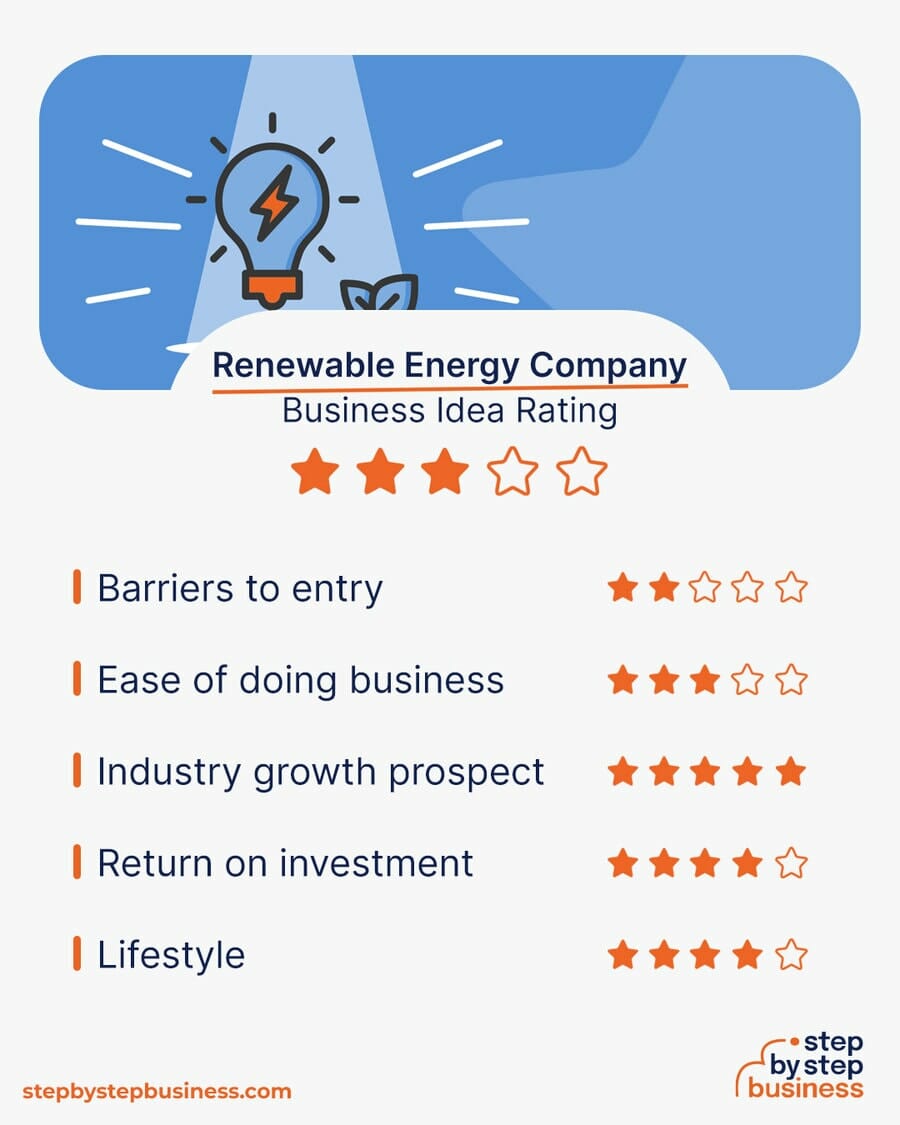
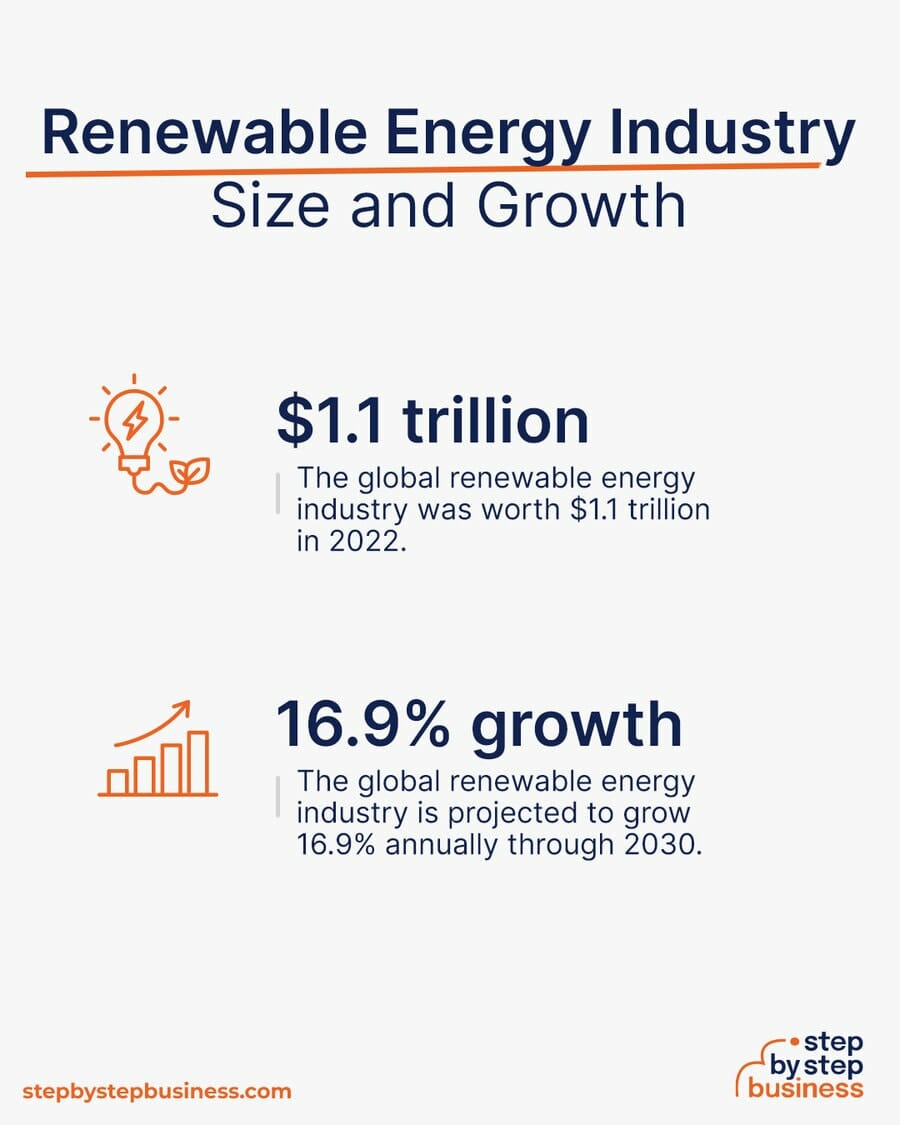
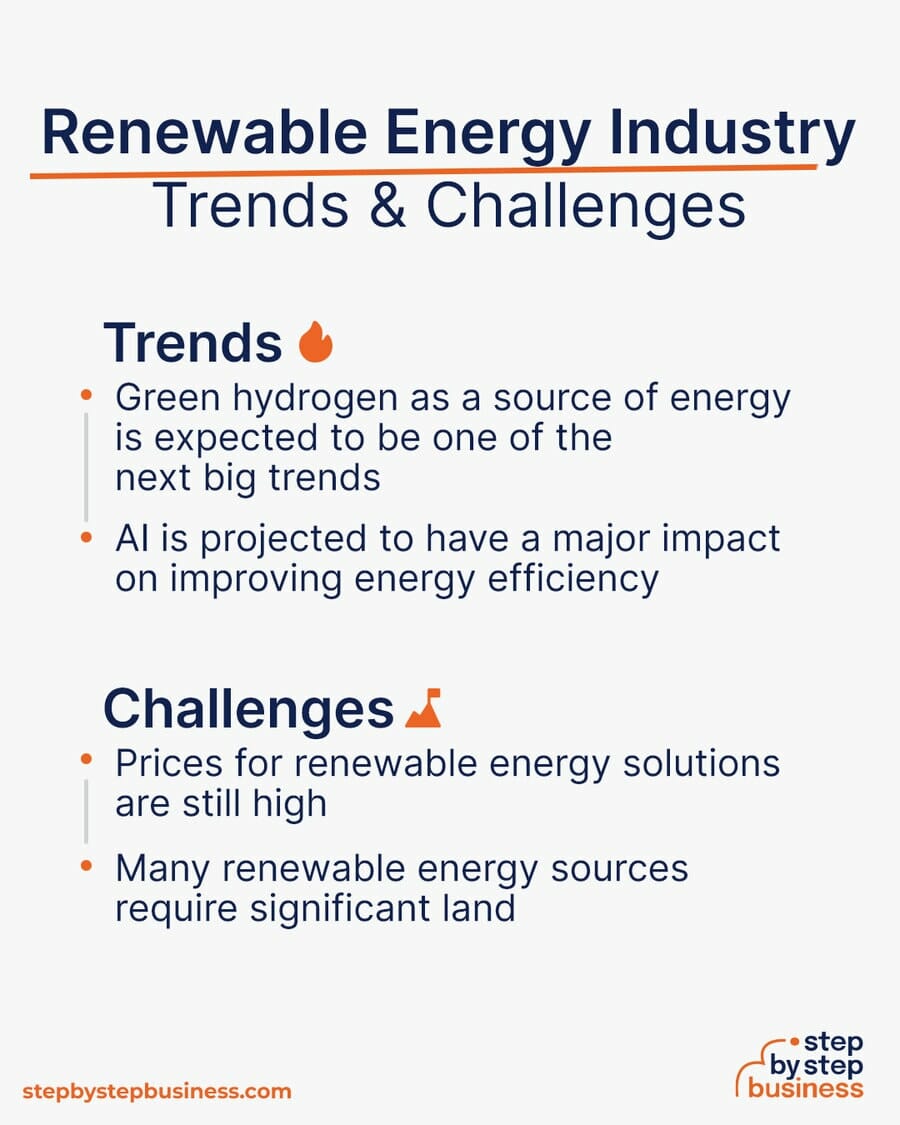
Trends
Challenges
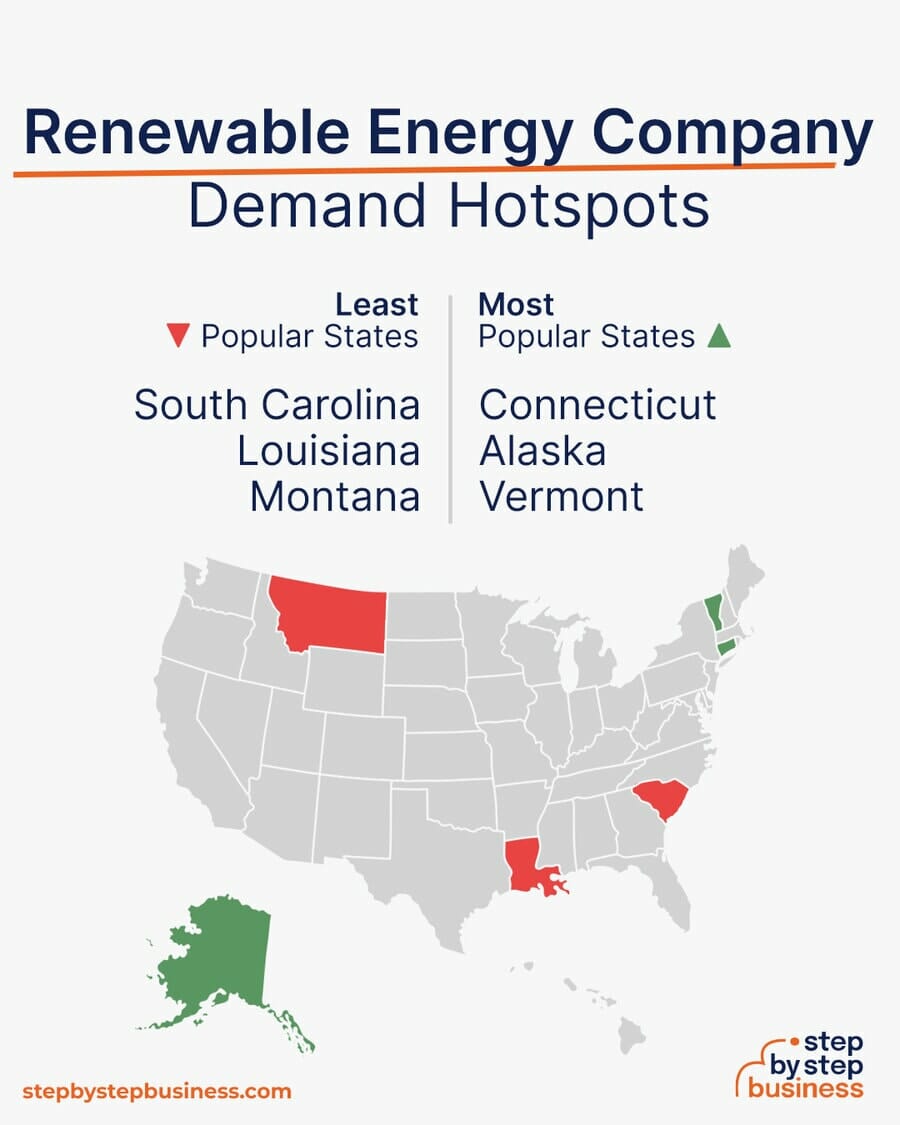
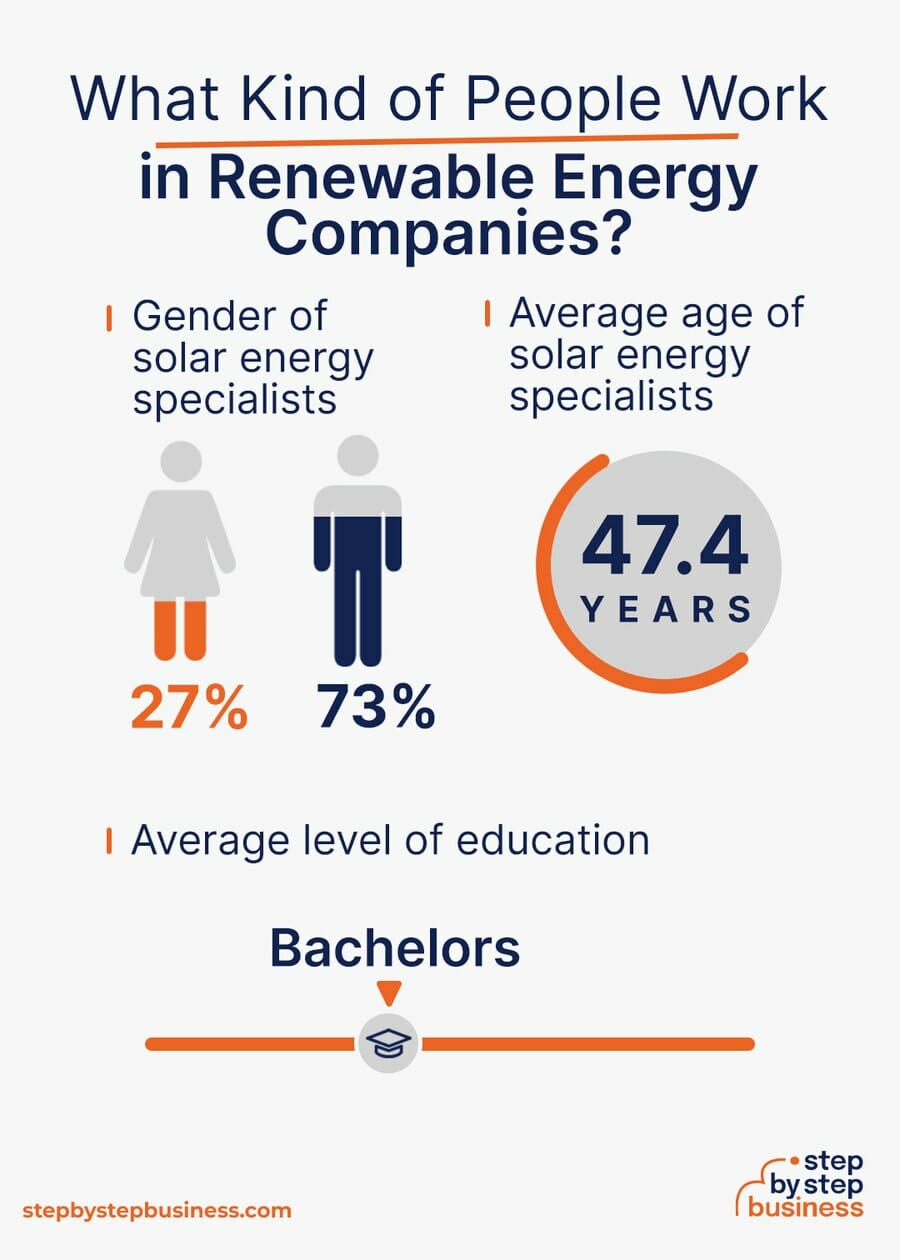
The costs of starting a renewable energy company obviously vary based on the type of company you plan to start. Here we’ll discuss starting a solar panel installation company.
Startup costs for a solar panel installation company range from $90,000 to $170,000. Costs include equipment and an inventory of solar panels.
| Start-up Costs | Ballpark Range | Average |
|---|---|---|
| Setting up a business name and corporation | $100 - $500 | $300 |
| Business licenses and permits | $100 - $300 | $200 |
| Insurance | $100-$500 | $300 |
| Website | $500 - $1,000 | $750 |
| Equipment | $5,000 - $10,000 | $7,500 |
| Inventory of solar panels | $50,000 - $100,000 | $75,000 |
| Truck | $30,000 - $50,000 | $40,000 |
| Space rental | $5,000 - $10,000 | $7,500 |
| Total | $90,800 - $172,300 | $131,550 |
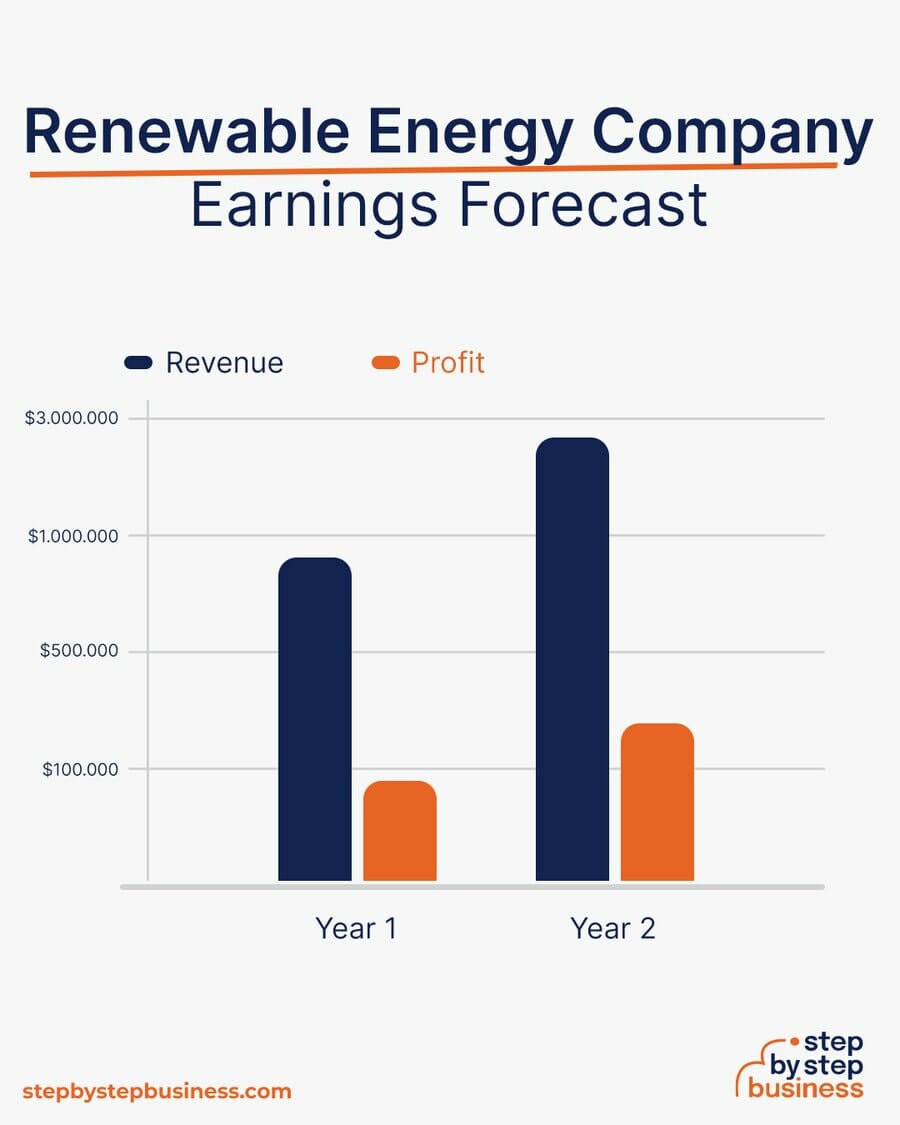
Again, we’ll use a solar panel installation company as an example.
You’ll charge an average total price of about $15,000 for a residential solar panel system installation. Your profit margin after the costs of materials and labor should be about 10%.
In your first year or two, you might do five installations a month, bringing in $900,000 in revenue. This would mean $90,000 in profit, assuming that 10% margin.
As you gain traction, you and your crew might do 15 installations a month. With annual revenue of $2,700,000, you’d make a tidy profit of $270,000.
There are a few barriers to entry for a renewable energy company. Your biggest challenges will be:
Now that you know what’s involved in starting a renewable energy, it’s a good idea to hone your concept in preparation to enter a competitive market.
Market research could give you the upper hand even if you’ve got the perfect product. Conducting robust market research is crucial, as it will help you better understand your customers, your competitors, and the broader business landscape.
Research renewable energy companies to examine their products and services, price points, and customer reviews.
This should identify areas where you can strengthen your business and gain a competitive edge to make better business decisions.
You’re looking for a market gap to fill. For instance, maybe the local market is missing an energy efficiency consulting company or a wind energy company.
You might consider targeting a niche, such as solar panels.
Your products and services will depend on the niche you choose in the renewable energy market.
Here’s a list of opportunities for renewable energy companies:
Your prices should be based on market prices for the products and services you offer, but also on your costs.
Once you know your costs, use this our profit margin calculator to determine your mark-up and final price points. Remember, the prices you use at launch should be subject to change if warranted by the market.
Your target market will also be based on your niche. Millennials tend to be most interested in renewable energy, so you should likely focus your marketing on sites like Instagram and Facebook.
Choosing the right location for a renewable energy business is a critical decision influenced by the specific niche of the enterprise. For instance, a business focused on harnessing solar energy should prioritize regions with consistent sunlight, ensuring optimal energy generation.
On the other hand, a wind energy venture would thrive best in areas known for sustained wind speeds. Tidal and wave energy operations necessitate proximity to the ocean, while bioenergy companies benefit from being close to raw material sources like agricultural areas.
Conversely, businesses focused on sales, consulting, or software solutions for renewable energy may prioritize accessibility to major commercial centers or tech hubs to cater to a broader clientele and tap into talent pools.
Regardless of the niche, it’s also important to consider local regulations, incentives, and the overall business environment of a potential location, as these factors can significantly impact operational costs and success.
Here are some ideas for brainstorming your business name:
Once you’ve got a list of potential names, visit the website of the US Patent and Trademark Office to make sure they are available for registration and check the availability of related domain names using our Domain Name Search tool below. Using “.com” or “.org” sharply increases credibility, so it’s best to focus on these.
Finally, make your choice among the names that pass this screening and go ahead and reserve your business name with your state, start the trademark registration process, and complete your domain registration and social media account creation.
Your business name is one of the key differentiators that sets your business apart. Once you pick a name, reserve it and start with the branding, it’s hard to switch to a new name. So be sure to carefully consider your choice before moving forward.
Here are the key components of a business plan:

If you’ve never created a business plan, it can be an intimidating task. You might consider hiring a business plan specialist to create a top-notch business plan for you.
Registering your business is an absolutely crucial step — it’s the prerequisite to paying taxes, raising capital, opening a bank account, and other guideposts on the road to getting a business up and running.
Plus, registration is exciting because it makes the entire process official. Once it’s complete, you’ll have your own business!
Your business location is important because it can affect taxes, legal requirements, and revenue. Most people will register their business in the state where they live, but if you are planning to expand, you might consider looking elsewhere, as some states could offer real advantages when it comes to renewable energy companies.
If you’re willing to move, you could really maximize your business! Keep in mind, it’s relatively easy to transfer your business to another state.
Business entities come in several varieties, each with its pros and cons. The legal structure you choose for your renewable energy company will shape your taxes, personal liability, and business registration requirements, so choose wisely.
Here are the main options:

We recommend that new business owners choose LLC as it offers liability protection and pass-through taxation while being simpler to form than a corporation. You can form an LLC in as little as five minutes using an online LLC formation service. They will check that your business name is available before filing, submit your articles of organization, and answer any questions you might have.
Choose Your State
The final step before you’re able to pay taxes is getting an Employer Identification Number, or EIN. You can file for your EIN online or by mail or fax: visit the IRS website to learn more. Keep in mind, if you’ve chosen to be a sole proprietorship, you can simply use your social security number as your EIN.
Once you have your EIN, you’ll need to choose your tax year. Financially speaking, your business will operate in a calendar year (January–December) or a fiscal year, a 12-month period that can start in any month. This will determine your tax cycle, while your business structure will determine which taxes you’ll pay.
The IRS website also offers a tax-payers checklist, and taxes can be filed online.
It is important to consult an accountant or other professional to help you with your taxes to ensure you are completing them correctly.
Securing financing is your next step and there are plenty of ways to raise capital:
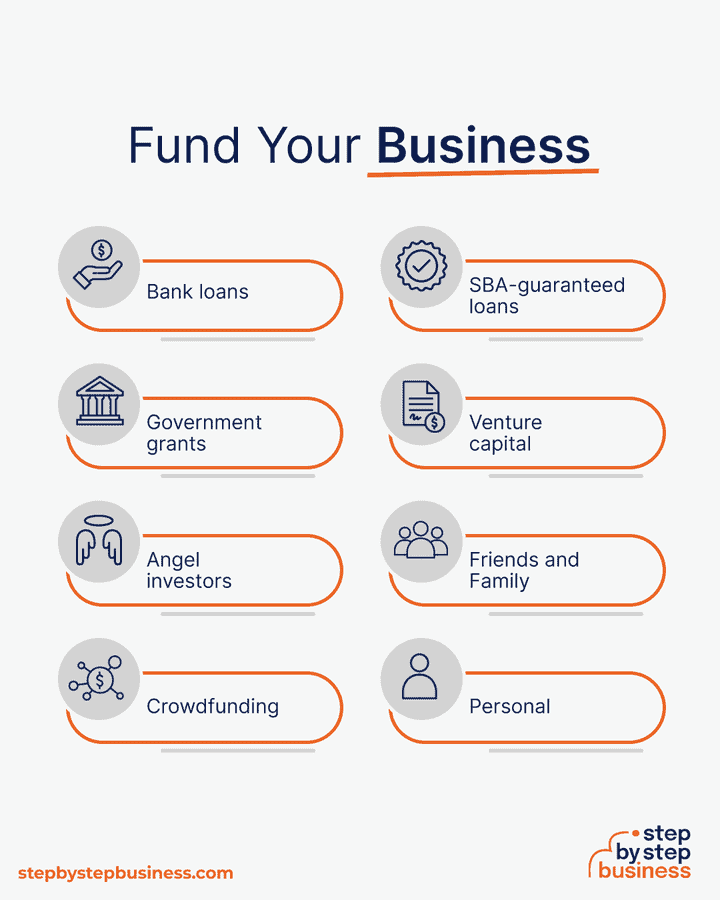
Bank and SBA loans are probably the best option, other than friends and family, for funding a renewable energy business. You might also try crowdfunding if you have an innovative concept, or you may be able to attract angel investors or venture capital.
Starting a renewable energy business requires obtaining a number of licenses and permits from local, state, and federal governments.
Federal regulations, licenses, and permits associated with starting your business include doing business as (DBA), health licenses and permits from the Occupational Safety and Health Administration (OSHA), trademarks, copyrights, patents, and other intellectual properties, as well as industry-specific licenses and permits.
You may also need state-level and local county or city-based licenses and permits. The license requirements and how to obtain them vary, so check the websites of your state, city, and county governments or contact the appropriate person to learn more.
You could also check this SBA guide for your state’s requirements, but we recommend using MyCorporation’s Business License Compliance Package. They will research the exact forms you need for your business and state and provide them to ensure you’re fully compliant.
This is not a step to be taken lightly, as failing to comply with legal requirements can result in hefty penalties.
If you feel overwhelmed by this step or don’t know how to begin, it might be a good idea to hire a professional to help you check all the legal boxes.
Before you start making money, you’ll need a place to keep it, and that requires opening a bank account.
Keeping your business finances separate from your personal account makes it easy to file taxes and track your company’s income, so it’s worth doing even if you’re running your renewable energy business as a sole proprietorship. Opening a business bank account is quite simple, and similar to opening a personal one. Most major banks offer accounts tailored for businesses — just inquire at your preferred bank to learn about their rates and features.
Banks vary in terms of offerings, so it’s a good idea to examine your options and select the best plan for you. Once you choose your bank, bring in your EIN (or Social Security Number if you decide on a sole proprietorship), articles of incorporation, and other legal documents and open your new account.
Business insurance is an area that often gets overlooked yet it can be vital to your success as an entrepreneur. Insurance protects you from unexpected events that can have a devastating impact on your business. A reliable insurance policy will also help your renewable energy company to avoid downtime by allowing you to access everything from vital solar panel inspection to wind turbine repair and even solutions for offshore technologies before unexpected setbacks become real problems.
Here are some types of insurance to consider:

As opening day nears, prepare for launch by reviewing and improving some key elements of your business.
Being an entrepreneur often means wearing many hats, from marketing to sales to accounting, which can be overwhelming. Fortunately, many websites and digital tools are available to help simplify many business tasks.
Field service management software, such as ServiceTitan, Jobber, or Field Nation, will enable you to manage your field service crew and oversee client management, scheduling, invoicing, task allocations, payroll, and re-organizing.
Website development is crucial because your site is your online presence and needs to convince prospective clients of your expertise and professionalism. You can create your own website using services like WordPress, Wix, or Squarespace. This route is very affordable, but figuring out how to build a website can be time-consuming. If you lack tech-savvy, you can hire a web designer or developer to create a custom website for your business.
Your customers are unlikely to find your website, however, unless you follow Search Engine Optimization (SEO) practices. SEO will help your website appear closer to the top in relevant search results, a crucial element for increasing sales.
Make sure that you optimize calls to action on your website. Experiment with text, color, size, and position of calls to action such as “Schedule Now” or “Order”. This can sharply increase purchases.
Here are some powerful marketing strategies for your future business:

Unique selling propositions, or USPs, are the characteristics of a product or service that sets it apart from the competition. Customers today are inundated with buying options, so you’ll have a real advantage if they are able to quickly grasp how your renewal energy company meets their needs or wishes. It’s wise to do all you can to ensure your USPs stand out on your website and in your marketing and promotional materials, stimulating buyer desire.
Global pizza chain Domino’s is renowned for its USP: “Hot pizza in 30 minutes or less, guaranteed.” Signature USPs for your renewable energy business could be:
You may not like to network or use personal connections for business gain. But your personal and professional networks likely offer considerable untapped business potential. Maybe that Facebook friend you met in college is now running a renewable energy business, or a LinkedIn contact of yours is connected to dozens of potential clients. Maybe your cousin or neighbor has been working in renewable energy for years and can offer invaluable insight and industry connections.
The possibilities are endless, so it’s a good idea to review your personal and professional networks and reach out to those with possible links to or interest in renewable energy. You’ll probably generate new customers or find companies with which you could establish a partnership.
Building a team for a renewable energy company is an intricate process, deeply rooted in the specific type of business and its operational model. Different segments of the renewable sector necessitate distinct expertise and roles.
For instance, a solar panel installation business will require skilled technicians familiar with solar systems, while a bioenergy firm might need experts in biochemistry and agricultural processes. An offshore wind energy venture would seek marine engineers and workers accustomed to offshore conditions. In contrast, a renewable energy consulting firm would emphasize hiring analysts, market researchers, and industry experts.
However, despite these niche requirements, there are several common roles across the renewable energy spectrum:
Free-of-charge methods to recruit employees include posting ads on popular platforms such as LinkedIn, Facebook, or Jobs.com. You might also consider a premium recruitment option, such as advertising on Indeed, Glassdoor, or ZipRecruiter. Further, if you have the resources, you could consider hiring a recruitment agency to help you find talent.
Renewable energy is the future, with the industry taking off as efforts increase to slow climate change. If you want to have a positive impact on the environment, you could start a renewable energy company in whatever niche you choose. In an industry worth $1 trillion and counting, you’ll also reap financial rewards.
You understand the business now, so you’re ready to develop your concept and get your renewable energy company going!
Yes, renewable energy companies can be profitable. As the demand for clean and sustainable energy sources increases, renewable energy companies have the opportunity to capitalize on this growing market. However, profitability can vary depending on factors such as the specific sector within the renewable energy industry, market conditions, government policies, and competition.
The activities at a renewable energy company can vary depending on its specific focus, such as solar, wind, hydro, geothermal, or bioenergy. However, some common activities that may occur during a typical day include:
The growth potential of a renewable energy company is significant. As countries and industries worldwide prioritize the transition to clean energy sources to mitigate climate change and reduce reliance on fossil fuels, the demand for renewable energy solutions continues to rise. The sector offers opportunities for expansion, innovation, and investment across various renewable technologies. However, growth potential can be influenced by factors such as government policies, market conditions, technological advancements, and public awareness.
A renewable energy company can fall under various types of businesses depending on its specific activities. Some common types include:

Published on July 13, 2022
Many major American businesses depend on outdoor activities, such as The North Face or Columbia. But there are also countless smaller businessesthat ...
Read Now
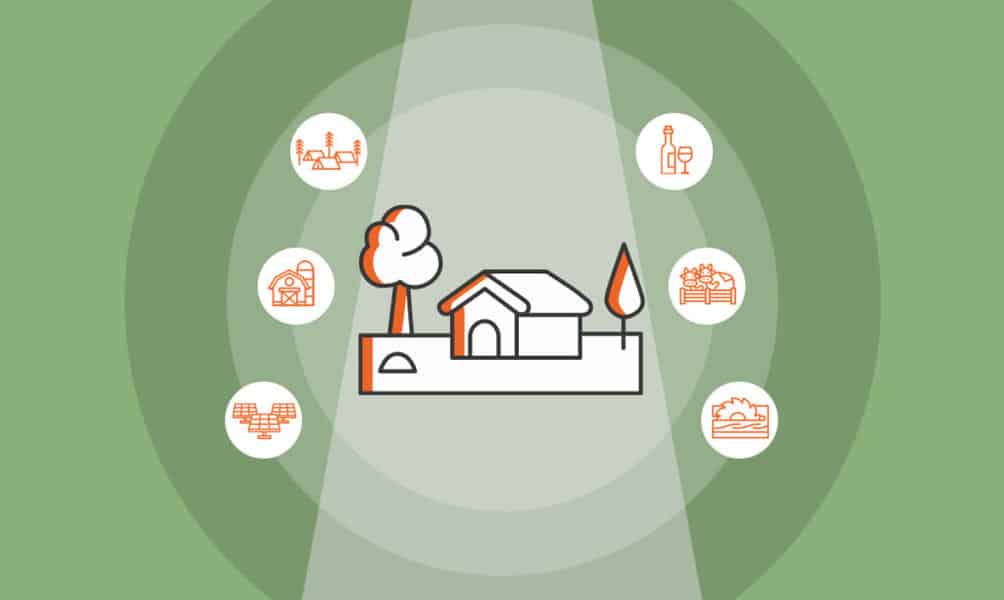
Published on July 13, 2022
Rural businesses typically provide value and economic strength to the community and generate income for the owner. If you live in a rural area, then ...
Read Now

Published on July 12, 2022
Looking to help save the world? There are countless eco-friendly business ideas to help you create a greener earth while also making a good living.B ...
Read Now
No thanks, I don't want to stay up to date on industry trends and news.
Comments